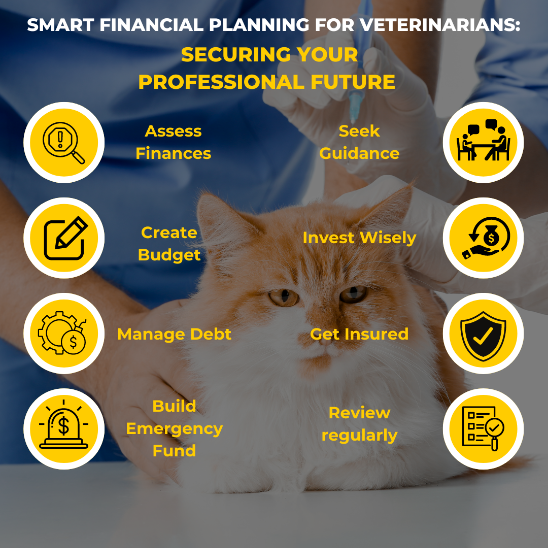As a veterinarian, you've dedicated your life to caring for animals. Have you given the same attention to your financial health? Whether you're a recent graduate or an established practitioner, smart financial planning is crucial for securing your professional future.

This blog provides targeted insights and strategies to help you take charge of your financial future, ensuring that your passion for animals is supported by a secure and prosperous life.
Assessing Your Current Financial Situation
Solid veterinary financial planning begins with a good understanding of personal finances and practice finances. Reviewing sources of income also emphasizes the diversification of revenue streams. This includes primary services such as consultations and surgeries, secondary services such as grooming and boarding, and special offerings such as acupuncture.
Understanding the value of vet practice sales can be a big part of long-term planning. Another significant item is expenditures, which can be divided into three areas: fixed costs (including rent and salaries), variable costs (such as medical supplies and marketing), and debt payments (for both student and practice loans).
Reviewing income in conjunction with classifying expenses will help veterinarians identify areas of savings and strategically improve their financial health and overall value to the practice.
Creating a Comprehensive Budget
With a clear understanding of your income and expenses, the next step is to create a budget that aligns with your financial goals. Specify these goals using the SMART criteria, meaning Specific, Measurable, Achievable, Relevant, and Time-bound. Examples of such goals range from the attainment of short-term goals like getting rid of high-interest debt, to long-term aspirations such as saving for retirement.
Once you have spelled out your goals, institute a budgeting system. Define your necessary expenses, discretionary spending, and savings or debt repayment. Additionally, budgeting apps help you to keep yourself on the right track and committed to your financial plan, which works for you toward your objectives.
Managing Debt Effectively
Debt management is a very important part of financial planning for veterinarians particularly due to the high costs associated with veterinary education. To reduce your student loan debt, make sure to research income-driven repayment plans, which can change payments according to your financial situation, or research Public Service Loan Forgiveness if you work for a non-profit or government organization.
Refinancing may also help in reducing interest rates. However, this may result in a loss of federal loan benefits. When it comes to managing business debt, it’s important to proceed with care. Clear out high-interest debt first, such as credit cards, and consider consolidating to make payments on a smaller number of loans and lower interest rates.
Use debt strategically for investing in equipment or expansions that will add profitability to your practice. These strategies will guide you through the enormous complexities of debt and forward toward a healthier financial future.
Building an Emergency Fund
Many people invest in building a savings account to help protect from unexpected costs or income disruption. Generally, veterinarians should save three to six months of living expenses based on their job security and the stability of their practice. If you own a practice, you should save more.
To begin saving for your fund, automate savings by depositing funds periodically from each payday, as well as setting aside direct windfalls such as tax refunds or bonuses in your fund. It's advisable to use a high-yield savings account to earn a better rate of interest. Working on these strategies will help you build a solid emergency fund, which will strengthen the strength of your financial security.
Investing for the Future
With the emergency fund in place and most of your high-interest debt wiped out, it's now time to save for growth through investments. Diversify your investment to minimize your risk exposure,
-
- Stocks: for the high returns on investment
- Bonds: for stability
- Mutual Funds: diversified exposure
- Real Estate: for income and appreciation.
Retirement plans. If your practice offers a 401(k), contribute enough to secure an employer match or consider an IRA that gives you tax benefits. If you're self-employed, consider a SEP IRA to increase contributions. Save as early as possible because, over the long term, money adds up significantly through compound interest.
Insuring Your Financial Future
Proper insurance coverage is essential for safeguarding your financial future against unexpected events. Key types of insurance for veterinarians include professional liability insurance to pay malpractice claims, health insurance to manage medical costs, disability income protection in case of illness or injury, and life insurance to secure your family's financial future.
It is important to update your insurance policies regularly after major life events like marriage, birth of a child, or changes in your practice. Updating your insurance coverage as needed ensures you are protected against any unforeseen circumstances.

Seeking Professional Guidance
Although this guide gives you a general background, working with an advisor would further tailor your plan to meet your own needs and goals. When searching for an advisor, look for someone with experience in the veterinary field, committed to acting in your best interest, and must be transparent about his fees and services.
It's also a good idea to ask how much experience he has with practice valuations and succession planning. Use veterinary associations and networking sites to leverage resource usage. Attend financial planning workshops that are held during conferences, participate in online forums sharing insights with peers, and investigate mentorship programs while learning from experienced practitioners.
Financial planning is an ongoing process, so it pays to review and modify your plan at regular intervals as your circumstances and objectives change.
Conclusion
Secure a future in smart financial planning as a veterinarian. With a look at your scenario, a budget of which debt you want to pay off and create an emergency fund as well as invest prudently, also get professional help, and you can be on the right track. This ensures personal security and enables you to do what is best with animals.
Start applying these tips today and take control of your financial future. Your future self will be grateful, and so will your four-legged patients.
FAQs
- What types of insurance do I need as a veterinarian?
Essential insurances include professional liability, health insurance, disability insurance, and life insurance, all of which protect your personal and professional finances
- What should be my top priority when creating a financial plan?
Build an emergency fund first to provide liquidity for unexpected expenses, followed by paying off debt and setting clear financial goals.
- How often should I review my financial plan?
Review your financial plan at least once a year or whenever you have experienced a major life event like a new job or a baby arriving since your goals and financial situations likely changed, hence the need for reviewing your past plan.








For More: https://devtechnosys.com/fintech-software-devel... more